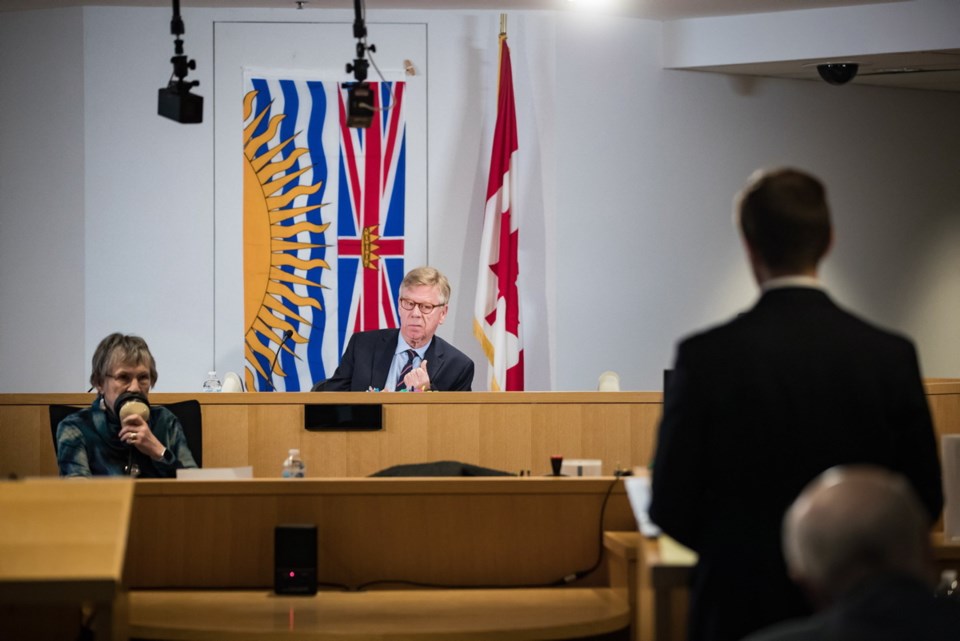There was a glimpse Monday at the opening of the public inquiry into money laundering of how easy it is to slip down confusing rabbit holes about who said or did what about the problem in years gone by.
Justice Austin Cullen got formal proceedings underway in Â鶹´«Ă˝Ół»on schedule. But in Victoria, Attorney General David Eby and his B.C. Liberal predecessor, Mike de Jong, got into a bewildering back and forth about whether Cullen will get access to documents from the Liberal era.
As it stood Monday afternoon, he will. De Jong told reporters the commission will get whatever it asks for in relation to cabinet documents from the B.C. Liberals’ time in office. In other words, no holdbacks, no redactions.
That’s a far cry from what Eby portrayed at a full-fledged news conference earlier, where he mused about Liberal “negligence” and “corruption” and suggested de Jong was balking at handing over the relevant background.
De Jong has a say by way of a parliamentary convention that deposed governments retain authority over their cabinet documents and have the right to determine what gets released.
Eby has been agitating about getting access to the Liberal cabinet’s money-laundering deliberations for well over a year. It’s partly because it would be instructive to know what they did. But there’s also a heaping helping of politics in the works, which isn’t uncommon with Eby.
He wants to embarrass the opposition by putting them on the spot. So he went to some lengths to highlight their “inexplicable failure to commit in an unqualified way to disclosure of all relevant cabinet documents.”
But three hours later, de Jong did just that. He promised to reporters the commission will get full unqualified disclosure of all relevant documents.
Eby charged that de Jong had earlier wanted the right to decide which documents the commission would get.
“MLA de Jong is the last person on Earth who should be taking on this task,” said Eby. He did chapter and verse on how poorly de Jong and the previous government performed on the money laundering issue.
For his part, de Jong released a letter he wrote two weeks ago to the Cullen Commission saying he was anxious to ensure it had access to everything it needs.
He also asked for a direct line of communications, rather than through the Ministry of Attorney General, due to Eby’s “propensity to comment inaccurately on my correspondence.
“The important work deserves to be undertaken independently and free from the partisan rhetoric the present attorney general appears incapable of refraining from.”
After 18 months of intermittent crossfire over the issue, it looks like it’s resolved, subject to the records actually being handed over.
The creation of the public inquiry looks to have smoothed the way. If it was still just Eby asking for them, it likely would have taken years more argument, given the mutual distrust.
The opposition likely played some games with Eby over releasing the documents. But he should clam up, now that the show’s underway.
Making pronouncements about the previous government’s dismal record from the attorney general’s podium adorned with a “Cracking Down on Money Laundering” logo doesn’t exactly set a tone for independent, impartial fact-finding.
Apart from scorning the Liberal record, Eby also predicted de Jong will be a significant witness at the hearings, and the documents “could be profoundly damaging to his professional reputation, should such documents exist.”
Maybe the commission should be the one to decide that. It’s got all the authority to do just that, should it choose, because Eby wrote it into the terms of reference. It’s instructed to make findings on “the acts or omission of regulatory authorities or individuals” and whether they contributed to money laundering.
It also has nine lawyers on staff, four in-depth reports already released and almost 18 months to reach some conclusions. They don’t need the attorney general steering them in any particular direction.
The big challenge will be to avoid getting bogged down in sideshow arguments that could consume weeks and gobble up tax dollars.
Those were some of the worries when the NDP government spent a year deliberating about a public inquiry. It’s a worry that should be kept top of mind.



